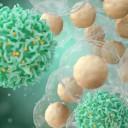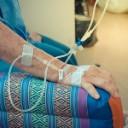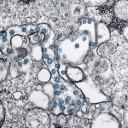-
May 15: The Week in Cancer News
A study indicates that children with cancer are not at increased risks of severe cases of COVID-19, and researchers find that Medicaid expansion was associated with reduced cancer deaths.
by Kate Yandell
-
May 8: The Week in Cancer News
A study finds that opioid deaths have slightly increased among people with cancer, and the Food and Drug Administration approves a targeted therapy for non-small cell lung cancer.
by Kate Yandell
-
May 1: The Week in Cancer News
At the AACR Virtual Annual Meeting I, researchers presented new data on cancer biology, treatment, screening and risk reduction.
by Cancer Today Staff
-
April 24: The Week in Cancer News
A third of cancer survivors report that they or their partners have stayed in jobs due to concerns about keeping health insurance, and the Food and Drug Administration approves a new treatment for metastatic triple-negative breast cancer.
by Kate Yandell
-
April 17: The Week in Cancer News
A study shows that antibiotic use prior to starting immunotherapy for melanoma is associated with decreased survival, and the Food and Drug Administration approves a treatment for advanced HER2-positive breast cancer.
by Kate Yandell
-
April 10: The Week in Cancer News
A study indicates that the rate of e-cigarette use is elevated in young adults with a history of cancer, and oncologists write about the impact of COVID-19.
by Kate Yandell
-
April 3: The Week in Cancer News
CAR-T cell therapy shows promise for treating mantle cell lymphoma, and the Food and Drug Administration requests that drugmakers pull the anti-heartburn drug ranitidine due to concerns about a contaminant that may increase cancer risk.
by Kate Yandell
-
March 27: The Week in Cancer News
Cancer patients and survivors share tips for coping with the uncertainty and isolation brought on by the coronavirus, and the coronavirus is impacting cancer clinical trials and treatment.
by Kate Yandell and Marci A. Landsmann
-
March 20: The Week in Cancer News
The spread of the coronavirus is having an impact on cancer care, and the Food and Drug Administration will require cigarette packaging and advertisements to come with new graphic warning labels.
by Kate Yandell
-
March 13: The Week in Cancer News
Experts offer information and cancer centers take precautions in light of the novel coronavirus, and the Food and Drug Administration approves an immunotherapy combination for liver cancer.
by Kate Yandell
Cancer Talk
Treatment Combination Improves Survival in EGFR-positive Lung Cancer
Adding chemotherapy to targeted therapy improves outcomes for people with advanced EGFR-positive non-small cell lung cancer.
by Sandra Gordon
Lessons From 20 Years Living With CancerMultiple myeloma survivor Jonathan Gluck reflects on uncertainty, and the scientific progress that has kept him living with cancer for more than two decades.
by Eric Fitzsimmons
The Enduring Importance of Cancer Disparities ResearchOpening session from AACR conference highlights how perseverance and adversity have informed cancer disparities research over the years.
by Eric Fitzsimmons
Most Cancer Survivors Don’t Meet Healthy Diet GoalsDespite research linking fruits and vegetables to cancer survival, many people do not change their eating habits after diagnosis.
by Darlene Dobkowski














